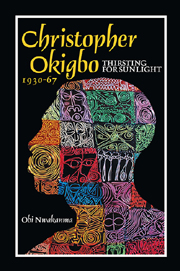Book contents
- Frontmatter
- Contents
- Preface
- Acknowledgements
- Chronology
- Dedication
- Photographs
- Maps
- Okigbo family tree
- 1 A river goddess, his mother's death & a headmaster father
- 2 Sportsman, actor & ‘effortless genius’
- 3 Cricket, classics, politics & urbane dissipation
- 4 Colonial civil servant, covert businessman & bankrupt
- 5 Poetry gives purpose to his voice
- 6 A librarian ravenous for literature & women
- 7 Gentleman, poet & publisher
- 8 Aftermath of a coup, running arms & advancing to death
- Epilogue
- Index
1 - A river goddess, his mother's death & a headmaster father
OJOTO 1930–45
Published online by Cambridge University Press: 05 April 2013
- Frontmatter
- Contents
- Preface
- Acknowledgements
- Chronology
- Dedication
- Photographs
- Maps
- Okigbo family tree
- 1 A river goddess, his mother's death & a headmaster father
- 2 Sportsman, actor & ‘effortless genius’
- 3 Cricket, classics, politics & urbane dissipation
- 4 Colonial civil servant, covert businessman & bankrupt
- 5 Poetry gives purpose to his voice
- 6 A librarian ravenous for literature & women
- 7 Gentleman, poet & publisher
- 8 Aftermath of a coup, running arms & advancing to death
- Epilogue
- Index
Summary
Before you, mother Idoto, naked I stand;
before your watery presence, a prodigal
leaning on an oilbean,
lost in your legend.
(‘The Passage’)Ojoto, Christopher Okigbo's birthplace, nestles deeply in what was once the tropical forest, east of Onitsha, the trading city near the river Niger. The hills rise and taper into a valley; the landscape falls into a rolling pattern which ends in Ojoto about fifteen miles away. The dusty red earth is roused in the dry seasons. The old dirt road forms into mysterious pathways from Nnewi to Onitsha, through Obosi and Nkpor, and through Umuoji to Oba. These are the neighbouring towns. Ojoto indeed lies between Oba and Nnewi. It is a densely populated part of the Igbo world. In Igbo communities, life throbs around a system of filial linkages – the kinship system in which all experience is collectively shared. Ojoto was no different. People have lived for thousands of years in this deep forest enclave in the heart of Igboland.
Ojoto men and women, like most Igbo people of Eastern Nigeria, are known for being restless and adventurous. Contact with European ‘civilization’ late in the nineteenth century gave impetus to that restless mobility. Before the turn of the twentieth century, people in Ojoto were mostly farmers and merchants, who traded across the somewhat dangerous terrain of Obosi and Nkpor to Onitsha, and even across the River Niger to Aboh and Asaba and far beyond. There are palm beaches. A deep green canvas of foliage envelops the landscape when the rains come.
- Type
- Chapter
- Information
- Christopher Okigbo 1930–67Thirsting for Sunlight, pp. 1 - 30Publisher: Boydell & BrewerPrint publication year: 2010

